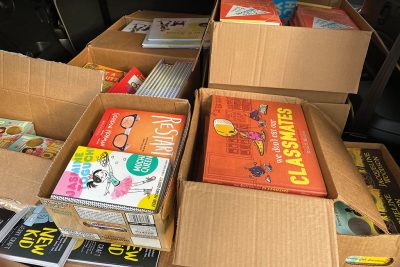Hartford Business Journal (Neag School alumnus and current doctoral student Amit Skavar is featured)
Weaving Equity Into the Fabric of Principal Training
Wallace Blog (Neag School’s redesigned UCAPP program is working to prepare leaders who will help ensure education equity)
Going Viral in the Time of COVID-19
UConn Magazine (Jennie Weiner pens commentary on a social media post going viral about not homeschooling during a pandemic – pg. 29)
Learning to Navigate the Uncertainties of School Leadership
Wallace Blog (Four aspiring principals, who are UCAPP students, get a glimpse of the work that lies ahead)
Reading and Language Arts Center Champions Literacy Amid Pandemic

In the wake of the pandemic, schools have pivoted to online learning. Rachael Gabriel, associate professor of literacy education and director of Neag School of Education’s Reading and Language Arts Center, knew she wanted to help the education community amid this major shift.
Fortunately, the Center already had been engaging literacy alumni and current students in events, professional development, and other efforts throughout the state. Gabriel saw this group, known as the Center’s Language and Literacy Fellows, as a built-in resource.
“When COVID-19 hit, I reached out to the listserv for this group to solicit ideas,” says Gabriel. She heard back from numerous alumni who shared a variety of ideas.
Engaging the Community Through Podcasts
“The first project we did in response to needs was to help educators feel more connected by starting a podcast where we interviewed experts and members of the Language and Literacy Fellows community,” says Gabriel.
“When schools first transitioned to distance learning … it became clear that the youngest readers needed to have more physical books in their hands to interact with, read repeatedly, and share.”
— Rachael Gabriel,
Reading and Language Arts Center director
The Literacy Fellows Podcast, launched in April and hosted on Podbean and also available through iTunes and Stitcher, features literacy experts including teachers, researchers, authors, and psychologists, discussing topics nominated by our alumni as particularly important during this time. There are currently 11 episodes, featuring such topics as engaging parents as partners in learning, and potential privacy issues related to online public education.
The podcast has close to 700 downloads thus far, and the feedback has been very positive. According to Gabriel, who conducted the interviews over Zoom and produced the segments, “the response was inspiring; it is clear that this modality helped educators feel more connected.”
Neag School alumna Jennifer DeRagon ’12 6th year, principal at George Hersey Robinson Intermediate School in Coventry, Connecticut, focused her podcast interview on what is working, what is happening, and most importantly, what is next, in online learning for her school.
In another podcast episode, Steve Staysniak, a high school English teacher at Metropolitan Business Academy in New Haven, discussed questions about privacy, private interests, and the future of public education online. Staysniak connected with UConn through his frequent participation with the Connecticut Writing Project.
Free Book Distribution Program
In addition to the podcast launch, Gabriel partnered with multiple education organizations to develop a free book distribution program across grade levels and a diverse population of schools, again inspired by input from the Language and Literacy Fellows.

“When schools first transitioned to distance learning, it became clear that the youngest readers needed to have more physical books in their hands to interact with, read repeatedly, and share,” Gabriel says. “They memorize all the little books around the house and do not have equal access, engagement, or pride in completing books read online.
“We heard that middle school students are more engaged when they feel a sense of community around their reading activities, when reading can be a social activity with discussion, sharing and trading, and we heard that high school students wanted more than just screens to engage, but had few ways to gain access to new texts with libraries and bookstores closed, and online orders delayed,” she adds.
“With children having been out of school for three months and the upcoming two-month summer break, this book initiative could not have been more timely.”
— Darcy Fiano ’11 Ph.D.,
CARR President
Gabriel connected with the Connecticut Association for Reading Research (CARR), which has Neag School alumna Darcy Fiano ’11 Ph.D. at its helm, as well as FirstBook Marketplace (FBM) a nonprofit that offers discounted and donated books to schools with a high percentage of low-income students. Funds from CARR and books from FBM were Gabriel’s initial source of support for starting summer reading programs at schools in New London and New Haven.
Fiano, CARR’s president, became acquainted with the Reading and Language Arts Center during her doctoral study in curriculum and instruction at the Neag School. She has also been an adjunct faculty member for the department. As CARR looks to partner with other Connecticut organizations focused on literacy, connecting with the Reading and Language Arts Center was a natural partnership.
With CARR and FBM, Gabriel helped carefully select and deliver more than 500 copies of books in English, Spanish, and dual-language texts to K-5 students enrolled at C. B. Jennings Dual Language and International Elementary Magnet School in New London.
“Access to quality reading material is an issue for many children locally, nationally, and globally,” says Fiano, who is also the supervisor of Literacy and Humanities at the Connecticut Technical Education and Career System. “In a recent 2018 study, limited access to books was a significant barrier to reading for children living in low-income neighborhoods, referred to by the authors as ‘book deserts.’ Studies indicate that access to books, the number of books in a home, correlate positively with higher academic performance.”
The pandemic, Fiano says, has made the already limited access to books even worse for kids.
“Access to both print and digital text has been impacted by closures of book repositories, as well as limited or no technology and/or internet access in the home,” she says. “With children having been out of school for three months and the upcoming two-month summer break, this book initiative could not have been more timely.”
Through the partnership, the Reading and Language Arts Center provided students with a choice of more than 10 titles per grade band, with a particular focus on books that have earned students’ choice awards.
“Students during COVID-19 do not have access to schools, nor libraries,” says Leah Champ Burdick, assistant principal at New London’s C. B. Jennings. “This means that they have limited access to new books to read. Getting a new book on their level is crucial to literacy development.
“The district is grateful for this opportunity to put new and popular books into our students’ hands,” she adds.
The summer reading program launched next at Metropolitan Business Academy in New Haven, which received books for all 92 of the students in one freshman-level team. English teacher Staysniak connected Gabriel with the school and their desire to provide books for students.
“Like most public schools, our budget for books is one of the first places we are asked to trim. I rarely get a budget to purchase books for my classroom library,” says Staysniak. “Any time we can put high-interest, high-quality texts into our students’ hands, that is incredibly helpful.”
Stayniak says he understands the importance of students having actual books versus devices. “We are all spending far too much time on screens,” he says. “While school and public libraries (especially in New Haven) are doing a fantastic job of making electronic and digital materials available to students, the physical book gives students a different ‘look’ when it comes to seeing the world and understanding peoples’ perspectives.
“As an educator, I am immensely grateful for both the scholarship and outreach that comes from UConn,” he adds. “I feel fortunate to live in a state where our flagship public university does hold the highest standard when it comes to raising the standard of learning for teachers and schools.”
George Hersey Robinson (GHR) Intermediate School in Coventry also became a partner in the summer reading program, receiving a donation, funded by the Reading and Language Arts Center, of Nutmeg book nominees for approximately 370 students.
“These books were provided so that students could have some choice, but also be engaged in a shared reading experience with room to discuss, trade, and share with their peers,” says Gabriel.
The initiative, principal DeRagon says, was critical. “It allowed us to purchase at least one book per student at GHR to support reading over the summer. More than ever, students do not have immediate, free access to books due to this pandemic,” she says. “Our primary drivers for this project were the ideas of access and choice. As literacy research has proven, students are more likely to read if they choose what to read rather than a mandatory book.”
Measuring Impact Through Research
In addition to providing books to students at the three schools, Gabriel wanted to include a research component to measure the engagement and impact of distributing this particular set of books.
She and her team have designed a study to learn more about which of the books students are reading, and how they are read. “It will offer new insight for summer reading research, which routinely measures how much students read, but not when and how,” she says.
At the same time, Gabriel admits, “merely providing books isn’t enough.” That is, she says, “students need reasons to read, discussions about what they’ve read, social support for reading, skill support or people to read with them, and access to identity resources that make them want to pick up a book.”
“In short, there’s no more important strategy for stemming and reversing summer learning loss than ensuring students have access to texts they can, and want, to read.”
— Rachael Gabriel
While many students do read a great deal, the texts they engage with may not be similar to those assessed in schools. Meaning all kinds of texts, including books that are not classic novels like those tested. Over the summer months, slides in reading achievement accumulate into a gap as large as the national achievement gap between students from different socioeconomic levels.
“Summer losses alone add up to the full extent of the achievement gap by fourth grade,” says Gabriel. “This means students in lower-socioeconomic status (SES) settings can and do learn as much (or more) during the year as their higher-SES peers, but they do not maintain or increase at the same rate over the summer.”
Summer reading programs and book distribution programs have each proven to have a dramatic effect on reading habits, engagement, and achievement — so much so that they have been shown to limit or even reverse losses over the summer. Some studies suggest that providing students access to free books for voluntary summer reading has a more substantial effect on their achievement than attending summer school.
“In short,” Gabriel says, “there’s no more important strategy for stemming and reversing summer learning loss than ensuring students have access to texts they can, and want, to read.”
The Reading and Language Arts Center is also offering professional development opportunities, including a FREE Online Course focusing on literacy learning during difficult times and a Literacy Specialist Program, which fulfills certification for licenses 102 or 097.
Don’t Open a New Charter School in the Middle of a Pandemic
Citizen Truth (Preston Green quoted)
Working From Home Is Amplifying Your Workplace Issues. Here’s How To Fix It.
Forbes (Amanda Slavin, a Neag School alumna and branding firm CEO, is interviewed about workplace issues with working from home)
BOE Vote on Guilford Indians Nickname Likely to Follow Hearing
Zip o6 (Glenn Mitoma is quoted regarding the racial impact of a school’s Native American mascot)
Saga of Seized Diploma Continues
Republican American (Preston Green is interviewed about the legal impact of withholding a diploma)
Making a Case for Athlete Advocacy: Humanitarians, Olympism and Good Governance
Play the Game (Eli Wolff co-writes article about athlete advocacy)
